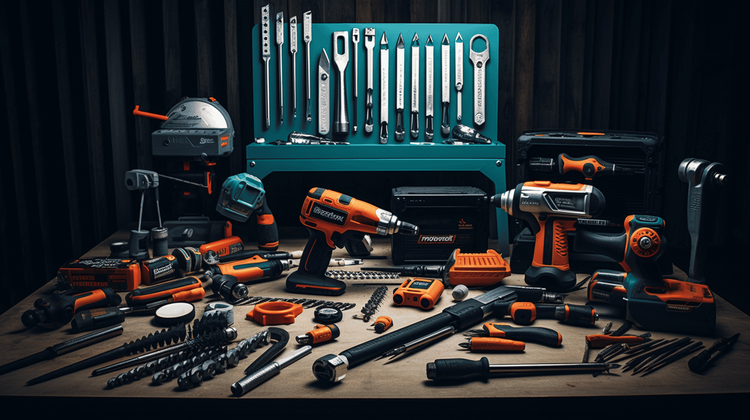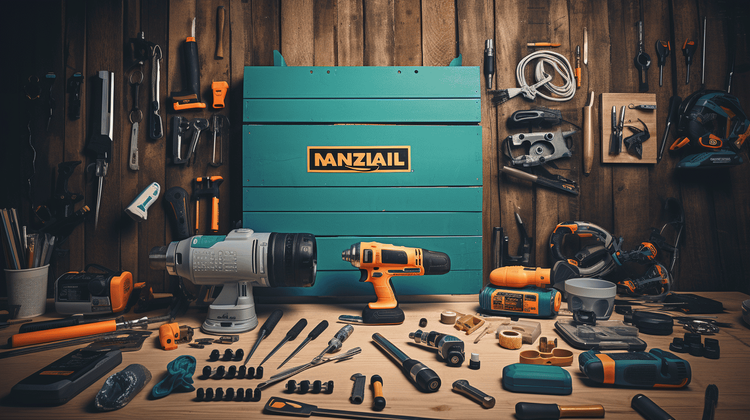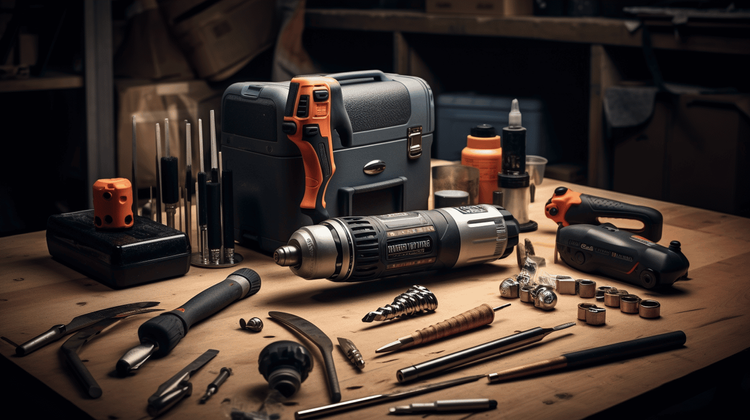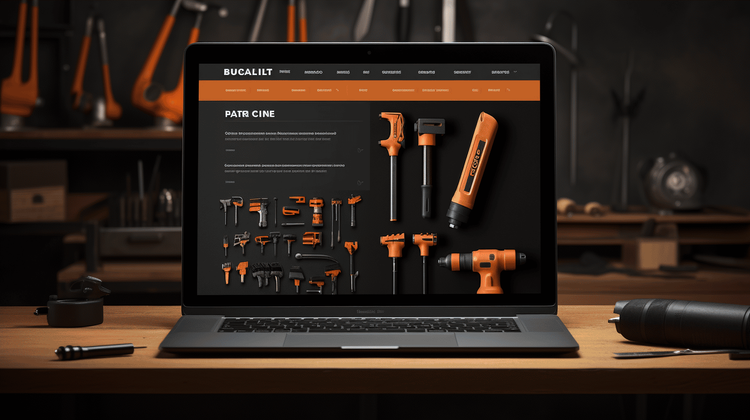Expert-Recommended Tools for Every DIY Enthusiast: Must-Haves for Success

Are you a DIY enthusiast who loves taking on projects around the house? Whether you're a seasoned pro or just starting out, having the right tools is essential for success. With the right tools in your arsenal, you can tackle any project with confidence and achieve professional results.
In this article, we will explore a variety of expert-recommended tools that every DIY enthusiast should have. From essential hand tools to power tools for efficiency and specialty tools for unique projects, we've got you covered. We'll also touch on safety equipment and organization/storage solutions to keep your tools safe and easily accessible. So, let's dive in and discover the must-have tools for your DIY endeavors!
Essential Hand Tools
When it comes to embarking on any DIY project, having the right tools can make all the difference in achieving success. Essential hand tools are a must-have for every DIY enthusiast. These tools are versatile, easy to use, and essential for a wide range of projects. Whether you're fixing a leaky faucet, assembling furniture, or hanging a picture frame, these hand tools will come in handy. So, let's take a look at the must-haves for your DIY toolbox:
Screwdriver Set
A good screwdriver set is an indispensable tool for any DIYer. From tightening screws to assembling furniture, a screwdriver set allows you to tackle a variety of tasks. Look for a set that includes both Phillips and flathead screwdrivers in various sizes, as these are the most common types of screws you'll encounter.
Hammer
A hammer is a versatile tool that can be used for a wide range of tasks. From driving nails to removing them, a hammer is essential for any DIY project. Look for a hammer with a comfortable grip and a sturdy head for maximum effectiveness.
Pliers
Pliers are an essential tool for gripping, bending, and cutting wires or objects. They come in various types, such as needle-nose pliers, lineman's pliers, and slip-joint pliers. Invest in a set that includes different types to cover all your needs.
Wrench Set
A wrench set is crucial for loosening and tightening nuts and bolts. Look for an adjustable wrench that allows you to adjust the size, as well as a set of combination wrenches for different sizes.
Tape Measure
A tape measure is an absolute must-have for accurate measurements. Whether you're measuring a space for furniture or marking a piece of wood for cutting, a reliable tape measure is essential. Look for one with both metric and imperial units for versatility.
Having these essential hand tools in your toolbox will set you up for success in any DIY project. With these tools at your disposal, you'll be able to tackle a wide range of tasks with confidence and ease. Remember to choose quality tools that will last, as they will be valuable assets for all your future projects. So, grab your screwdriver, hammer, pliers, wrench, and tape measure, and get ready to tackle your next DIY adventure!
Power Tools for Efficiency
When it comes to tackling DIY projects, power tools can be a game changer. These tools are designed to provide efficiency, speed, and precision, allowing you to complete tasks quickly and effectively. Whether you're a seasoned DIY enthusiast or just starting out, having the right power tools in your arsenal can make all the difference. Here are some expert-recommended power tools that every DIY enthusiast should consider adding to their collection:
- Cordless drill: A cordless drill is a must-have for any DIYer. It's versatile and can be used for a variety of tasks, from drilling holes to driving screws. Look for a drill with multiple speed settings and a comfortable grip for extended use.
- Circular saw: If you frequently work with wood, a circular saw is a must. This powerful tool can make straight, clean cuts through lumber, plywood, and other materials. Look for a saw with adjustable cutting depths and a sturdy blade guard for safety.
- Jigsaw: A jigsaw is perfect for making curved or intricate cuts. It's great for cutting out shapes or making smooth, precise cuts on a variety of materials, such as wood, plastic, and metal. Look for a jigsaw with variable speed control for maximum versatility.
- Power sander: Sanding by hand can be time-consuming and tedious. A power sander can help you achieve smooth, professional-looking finishes in a fraction of the time. Look for a sander with variable speed settings and interchangeable sanding pads for different applications.
- Power drill: While a cordless drill is handy for smaller tasks, a power drill is a must for heavier-duty drilling and driving. Look for a drill with a powerful motor and adjustable speed settings to tackle a wide range of projects.
Investing in quality power tools can save you time and effort, allowing you to take on more complex projects with confidence. Remember to always follow safety guidelines and wear appropriate protective gear when using power tools.
Cutting Tools
When it comes to tackling DIY projects, having the right cutting tools is essential. These tools allow you to shape and trim materials with precision, ensuring that your projects turn out exactly the way you envision them. Whether you're working with wood, metal, or other materials, investing in a few high-quality cutting tools is a must. Here are some expert-recommended cutting tools that every DIY enthusiast should have in their toolkit:
1. Utility Knife
A utility knife is a versatile cutting tool that can handle a variety of tasks. From scoring drywall to cutting carpet, this tool is a true workhorse. Look for a utility knife with a retractable blade for added safety and convenience.
2. Chisels
Chisels are essential for woodworking projects. They allow you to carve and shape wood with precision. Invest in a set of chisels with different blade widths to cater to various woodworking needs.
3. Miter Saw
A miter saw is a must-have tool for making accurate angled cuts. Whether you're cutting baseboards or crafting picture frames, a miter saw will help you achieve clean and precise cuts every time. Look for a miter saw with a laser guide for enhanced accuracy.
4. Utility Shears
Utility shears are ideal for cutting through various materials such as carpet, vinyl, and even thin metal sheets. They provide a clean and efficient cutting edge, making them perfect for small cutting tasks around the house.
Remember, safety should always be a top priority when working with cutting tools. Be sure to follow these safety tips:
- Always wear protective goggles to shield your eyes from flying debris.
- Use ear protection to prevent damage from loud noises produced by power cutting tools.
- When working with dusty materials, such as wood or drywall, wear a dust mask to protect your lungs.
- Use work gloves to protect your hands from cuts and abrasions.
- If you're working on a construction site or any area where there is a risk of falling objects, wear a hard hat for added protection.
With these cutting tools and safety measures in place, you'll be well-equipped to tackle your DIY projects with confidence. Happy cutting!
Measuring and Leveling Tools
When it comes to DIY projects, accuracy is key. Whether you're putting up shelves or building a piece of furniture, you want to make sure your measurements are spot on and everything is level. That's why having the right measuring and leveling tools in your arsenal is essential. These tools will help you achieve precise measurements and ensure that your projects are executed with precision. Here are some expert-recommended measuring and leveling tools that every DIY enthusiast should have:
1. Spirit Level
The spirit level is a classic leveling tool that has been around for decades. It consists of a long, straight body with a bubble vial filled with fluid. When the bubble is centered between the two lines inside the vial, it indicates that the surface is perfectly level. Spirit levels are available in different sizes, ranging from small handheld ones to larger ones that can be used for bigger projects. They are versatile and can be used for various tasks, such as checking the levelness of shelves, cabinets, and even floors.
2. Measuring Tape
The measuring tape is a must-have tool for any DIY enthusiast. It allows you to accurately measure distances, whether you're measuring the length of a piece of wood or determining the dimensions of a room. Look for a measuring tape with a lock feature that holds the tape in place once you've measured a distance. This will allow you to easily read the measurement without the tape retracting back.
3. Calipers
Calipers are precision measuring tools that are used for more intricate measurements. They can be used to measure the thickness of materials, the diameter of objects, and even the depth of holes. Calipers have two arms, one fixed and one movable, that can be adjusted to measure different dimensions. They are particularly useful for woodworking and metalworking projects where precise measurements are required.
4. Laser Level
The laser level is a modern tool that uses a laser beam to create a straight and level line. It is incredibly useful for hanging pictures, aligning tiles, and installing fixtures. Laser levels come in different types, including handheld ones and ones that can be attached to a tripod for greater stability. Some laser levels even have built-in features like self-leveling and the ability to project multiple lines at different angles.
Having these measuring and leveling tools in your toolbox will ensure that your DIY projects are executed with precision and accuracy. Don't underestimate the importance of accurate measurements and level surfaces—they can make a significant difference in the final outcome of your project. So, invest in quality tools that will help you achieve the best results.
"Measure twice, cut once." - An old carpentry saying.
Remember to always measure twice to double-check your measurements before cutting or installing anything. With the right measuring and leveling tools, you'll be well-equipped to tackle any DIY project with confidence. Stay tuned for the next section, where we'll discuss fastening and joining tools!
Fastening and Joining Tools
When it comes to DIY projects, fastening and joining tools are essential for creating sturdy and secure connections. Whether you're working with wood, metal, or other materials, having the right tools can make all the difference. From nail guns to clamps, these tools will help you fasten and join materials together with ease. So let's take a closer look at some of the must-have fastening and joining tools for every DIY enthusiast:
Nail Gun
A nail gun is a powerful tool that allows you to drive nails into different materials quickly and efficiently. Whether you're framing a wall or attaching trim, a nail gun can save you a lot of time and effort. There are different types of nail guns available, including framing nailers, brad nailers, and finish nailers, each designed for specific tasks. So choose the one that best suits your needs and get ready to experience the convenience of fastening with a nail gun.
Staple Gun
Similar to a nail gun, a staple gun is a versatile tool that uses staples instead of nails to join materials together. It is commonly used for upholstery projects, attaching fabric to wood frames, or securing wires and cables. A staple gun is easy to use and provides a stronger connection compared to traditional methods like hand stapling. So if you're planning any upholstery or crafting projects, a staple gun should be on your list.
Screw Gun
A screw gun, also known as a power screwdriver, is a handy tool for driving screws into various materials. It makes the process of screwing faster and more efficient compared to using a manual screwdriver. Whether you're assembling furniture or installing shelves, a screw gun will save you time and save your wrists from unnecessary strain. Look for a screw gun with adjustable torque settings to prevent overtightening screws and damaging the materials.
Wood Glue
While fasteners like nails and screws are commonly used, wood glue is another essential tool for joining wood pieces together. It provides a strong bond and helps create a seamless connection. Wood glue is particularly useful when you want to avoid visible fasteners or strengthen joints. Make sure to choose a high-quality wood glue that bonds quickly and dries clear for the best results. Apply the glue evenly to both surfaces, clamp them together, and let it dry according to the manufacturer's instructions.
Clamps
Clamps are versatile tools that are used to hold materials tightly together during glue-ups, assemblies, or when joining pieces with fasteners. They provide the necessary pressure to ensure a strong bond while the glue dries or while fasteners are inserted. There are various types of clamps available, including bar clamps, C-clamps, pipe clamps, and spring clamps, each designed for different purposes. Having a set of clamps in your toolbox will allow you to tackle a wide range of projects with ease.
So there you have it - the essential fastening and joining tools that every DIY enthusiast should have in their arsenal. These tools will not only make your projects easier but also ensure that your connections are strong and secure. Remember to always follow safety precautions when using power tools and handle sharp objects with care. Happy DIY-ing!
"With the right tools in your hands, you'll be amazed at what you can create!"
Safety Equipment
When it comes to DIY projects, safety should always be a top priority. Accidents can happen, but with the right safety equipment, you can minimize the risks and protect yourself. Here are some essential safety tools that every DIY enthusiast should have in their arsenal:
1. Safety goggles:
- Essential for protecting your eyes from flying debris, dust, and harmful chemicals.
- Look for goggles with a comfortable fit and proper ventilation to prevent fogging.
2. Ear protection:
- Protect your hearing from loud power tools and machinery with earmuffs or earplugs.
- Choose ear protection with a high noise reduction rating for effective hearing protection.
3. Dust mask:
- Protect your lungs from harmful dust and particles while sanding or working with chemicals.
- Select a mask that fits snugly and has a high filtration efficiency to ensure proper protection.
4. Work gloves:
- Keep your hands safe from cuts, abrasions, and splinters with a sturdy pair of work gloves.
- Look for gloves that offer a good grip and allow for dexterity to handle tools effectively.
5. Hard hat:
- Essential for construction and renovation projects where there is a risk of falling objects.
- Invest in a durable hard hat that meets safety standards and provides adequate head protection.
Remember, accidents can happen at any time, so it's important to prioritize safety and use these tools whenever necessary. By equipping yourself with the right safety equipment, you can enjoy your DIY projects with peace of mind.
"Safety first! Don't take any shortcuts when it comes to protecting yourself. Investing in quality safety equipment is investing in your own well-being."
Organization and Storage
One of the key aspects of being a DIY enthusiast is having an organized and efficient workspace. Having the right organization and storage tools can make a huge difference in your productivity and overall enjoyment of your DIY projects. Here are some essential organization and storage tools that every DIY enthusiast should have:
Toolbox
- A toolbox is a must-have for any DIY enthusiast. It provides a convenient and portable way to store and transport your tools.
- Look for a toolbox that is sturdy and has multiple compartments and organizers to keep your tools organized and easily accessible.
- Consider the size of the toolbox based on the number and size of tools you have, as well as the projects you typically work on.
Tool Chest
- If you have a larger collection of tools, a tool chest can be a great investment. It provides ample storage space and keeps your tools protected.
- Look for a tool chest that has multiple drawers and compartments for different types of tools.
- Consider features like lockable drawers and wheels for easy mobility.
Tool Bag
- A tool bag is a handy alternative to a toolbox or tool chest, especially if you need to carry tools to different locations.
- Look for a tool bag with multiple pockets and compartments to keep your tools organized.
- Consider the durability and comfort of the tool bag, especially if you will be carrying heavy tools.
Pegboard
- A pegboard is a versatile and customizable storage solution for your tools.
- Hang your tools on hooks and pegs on the pegboard, making them easily visible and accessible.
- Consider the size of the pegboard based on the number of tools you have and the available wall space in your workspace.
Having the right organization and storage tools will not only keep your workspace tidy but also save you time and frustration when searching for tools. It's important to find a system that works for you and suits your specific needs. So, go ahead and invest in these essential organization and storage tools to create a well-organized and efficient DIY space!
Specialty Tools for Unique Projects
In addition to the essential hand tools, power tools, cutting tools, measuring and leveling tools, fastening and joining tools, safety equipment, and organization and storage options, there are also specialty tools that can come in handy for unique DIY projects. These tools are designed for specific tasks and can make your job easier and more efficient. Whether you're into woodworking, plumbing, electrical work, or painting, having the right tools for the job is crucial. Here are some specialty tools that you may find useful:
Woodworking Tools
Woodworking is a popular DIY hobby, and having the right tools can make a big difference in the outcome of your projects. Some essential woodworking tools include:
- Chisels: Chisels are used for shaping and smoothing wood surfaces. They come in various sizes and shapes to suit different woodworking tasks.
- Router: A router is a versatile tool that can be used to make decorative edges, cut grooves, and create intricate designs on wood.
- Table Saw: A table saw is a powerful tool that allows you to make straight cuts on large pieces of wood. It is an essential tool for woodworking projects that require precision and accuracy.
Plumbing Tools
If you're tackling plumbing projects on your own, having the right tools is essential. Here are some plumbing tools you may need:
- Pipe Wrench: A pipe wrench is a heavy-duty wrench used to tighten or loosen pipes and fittings. It has adjustable jaws that can grip pipes of different sizes.
- Plunger: A plunger is a basic tool used to clear clogged drains and toilets. It creates pressure that forces blockages to move or break apart.
- Pipe Cutter: A pipe cutter is used to cut pipes cleanly and accurately. It is particularly useful when working with copper or plastic pipes.
Electrical Tools
Working with electricity can be dangerous, so it's important to have the right tools and knowledge to handle electrical projects safely. Here are some electrical tools you may need:
- Wire Stripper: A wire stripper is used to remove insulation from electrical wires. It has notches of different sizes to accommodate different wire gauges.
- Voltage Tester: A voltage tester is used to check whether an electrical circuit is live or not. It helps you identify potentially dangerous situations before working on them.
- Circuit Breaker Finder: A circuit breaker finder is used to locate specific circuit breakers in an electrical panel. It saves time and helps prevent accidental power interruptions.
Painting Tools
Painting can transform the look of a room or furniture, and having the right tools can make the job easier and give you better results. Here are some painting tools you may need:
- Paint Sprayer: A paint sprayer is a fast and efficient way to apply paint to large surfaces. It provides an even coat and can save you time compared to using a brush or roller.
- Paintbrushes and Rollers: Having a variety of paintbrushes and rollers in different sizes and types is essential for achieving different textures and finishes.
- Painter's Tape: Painter's tape is used to create clean and precise lines when painting. It prevents paint from bleeding onto surfaces that you don't want to be painted.
Remember, having the right tools for the job can make your DIY projects more enjoyable and successful. Invest in quality tools that suit your specific needs and take the time to learn how to use them properly for the best results.
"Having the right tools can make a big difference in the outcome of your projects. Whether you're into woodworking, plumbing, electrical work, or painting, having the right tools for the job is crucial."
Conclusion
In conclusion, having the right tools is essential for every DIY enthusiast. Whether you're a seasoned pro or just starting out, having a well-stocked toolbox can make all the difference in the success of your projects.
By investing in high-quality tools, you can ensure that your work is efficient, precise, and safe. From essential hand tools like screwdriver sets and hammers to power tools like cordless drills and circular saws, there are a variety of tools that can help you tackle any project with ease.
Additionally, cutting tools like utility knives and chisels, measuring and leveling tools like spirit levels and measuring tapes, and fastening and joining tools like nail guns and clamps are all must-haves for any serious DIYer.
It's also important to prioritize safety when working on DIY projects. Safety equipment such as safety goggles, ear protection, dust masks, work gloves, and hard hats should be worn to protect yourself from potential hazards.
Lastly, keeping your tools organized and properly stored is crucial for maintaining their longevity and ensuring easy access when you need them. Toolboxes, tool chests, tool bags, and pegboards are great options for keeping your tools in order.
Remember, the right tools can make all the difference in the success of your DIY projects. So, invest in quality tools, prioritize safety, and keep your tools organized to unleash your creativity and achieve amazing results.
Explore the wide range of DIY tools and accessories available at Ultra Handy's eCommerce Amazon store here. Happy DIYing!
Frequently Asked Questions
- What are the must-have tools for every DIY enthusiast?Some must-have tools for every DIY enthusiast include a cordless drill, a set of screwdrivers, a hammer, pliers, a tape measure, a utility knife, and a level.
- Why is a cordless drill an essential tool for DIY projects?A cordless drill is essential because it provides flexibility and convenience. It allows you to drill holes and drive screws without the need for an electrical outlet, making it efficient for working in different areas.
- What is the importance of having a set of screwdrivers?A set of screwdrivers is vital for DIY projects as it provides the right tools for fastening screws and opening various types of fasteners. Different sizes and types of screwdrivers ensure compatibility with different screw heads.
- Why is a tape measure necessary for DIY enthusiasts?A tape measure is essential for accurate measurement in DIY projects. It helps ensure precise cutting, placement, and alignment of materials, resulting in better overall outcomes.
- What is the significance of having a level in DIY projects?A level is crucial for ensuring that surfaces, shelves, and fixtures are perfectly horizontal or vertical. It helps achieve a professional and aesthetically pleasing finish by eliminating any unevenness or slanting.




